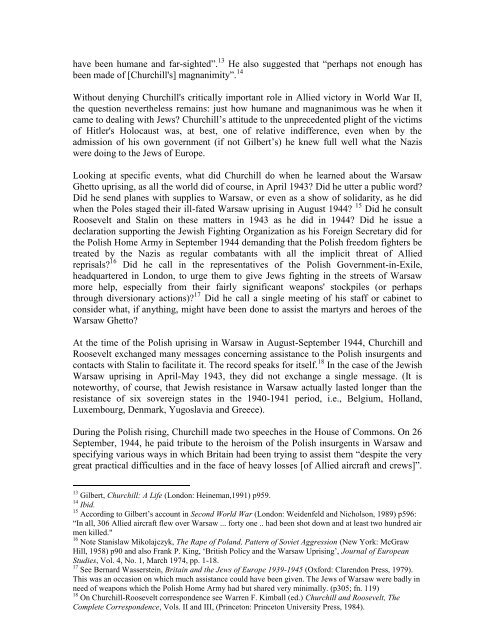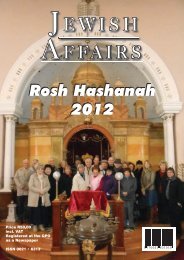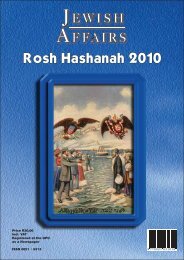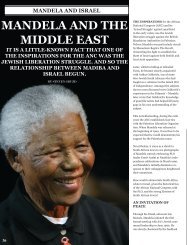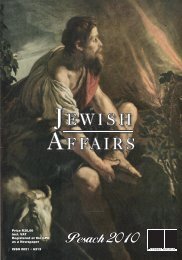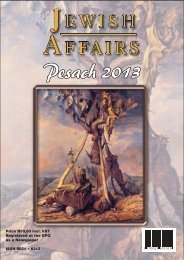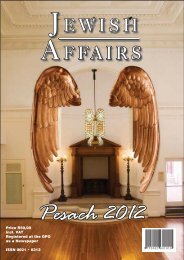ja chank 2008 - South African Jewish Board of Deputies
ja chank 2008 - South African Jewish Board of Deputies
ja chank 2008 - South African Jewish Board of Deputies
You also want an ePaper? Increase the reach of your titles
YUMPU automatically turns print PDFs into web optimized ePapers that Google loves.
have been humane and far-sighted”. 13 He also suggested that “perhaps not enough has<br />
been made <strong>of</strong> [Churchill's] magnanimity”. 14<br />
Without denying Churchill's critically important role in Allied victory in World War II,<br />
the question nevertheless remains: just how humane and magnanimous was he when it<br />
came to dealing with Jews? Churchill’s attitude to the unprecedented plight <strong>of</strong> the victims<br />
<strong>of</strong> Hitler's Holocaust was, at best, one <strong>of</strong> relative indifference, even when by the<br />
admission <strong>of</strong> his own government (if not Gilbert’s) he knew full well what the Nazis<br />
were doing to the Jews <strong>of</strong> Europe.<br />
Looking at specific events, what did Churchill do when he learned about the Warsaw<br />
Ghetto uprising, as all the world did <strong>of</strong> course, in April 1943? Did he utter a public word?<br />
Did he send planes with supplies to Warsaw, or even as a show <strong>of</strong> solidarity, as he did<br />
when the Poles staged their ill-fated Warsaw uprising in August 1944? 15 Did he consult<br />
Roosevelt and Stalin on these matters in 1943 as he did in 1944? Did he issue a<br />
declaration supporting the <strong>Jewish</strong> Fighting Organization as his Foreign Secretary did for<br />
the Polish Home Army in September 1944 demanding that the Polish freedom fighters be<br />
treated by the Nazis as regular combatants with all the implicit threat <strong>of</strong> Allied<br />
reprisals? 16 Did he call in the representatives <strong>of</strong> the Polish Government-in-Exile,<br />
headquartered in London, to urge them to give Jews fighting in the streets <strong>of</strong> Warsaw<br />
more help, especially from their fairly significant weapons' stockpiles (or perhaps<br />
through diversionary actions)? 17 Did he call a single meeting <strong>of</strong> his staff or cabinet to<br />
consider what, if anything, might have been done to assist the martyrs and heroes <strong>of</strong> the<br />
Warsaw Ghetto?<br />
At the time <strong>of</strong> the Polish uprising in Warsaw in August-September 1944, Churchill and<br />
Roosevelt exchanged many messages concerning assistance to the Polish insurgents and<br />
contacts with Stalin to facilitate it. The record speaks for itself. 18 In the case <strong>of</strong> the <strong>Jewish</strong><br />
Warsaw uprising in April-May 1943, they did not exchange a single message. (It is<br />
noteworthy, <strong>of</strong> course, that <strong>Jewish</strong> resistance in Warsaw actually lasted longer than the<br />
resistance <strong>of</strong> six sovereign states in the 1940-1941 period, i.e., Belgium, Holland,<br />
Luxembourg, Denmark, Yugoslavia and Greece).<br />
During the Polish rising, Churchill made two speeches in the House <strong>of</strong> Commons. On 26<br />
September, 1944, he paid tribute to the heroism <strong>of</strong> the Polish insurgents in Warsaw and<br />
specifying various ways in which Britain had been trying to assist them “despite the very<br />
great practical difficulties and in the face <strong>of</strong> heavy losses [<strong>of</strong> Allied aircraft and crews]”.<br />
13 Gilbert, Churchill: A Life (London: Heineman,1991) p959.<br />
14 Ibid.<br />
15 According to Gilbert’s account in Second World War (London: Weidenfeld and Nicholson, 1989) p596:<br />
“In all, 306 Allied aircraft flew over Warsaw ... forty one .. had been shot down and at least two hundred air<br />
men killed."<br />
16 Note Stanislaw Mikolajczyk, The Rape <strong>of</strong> Poland, Pattern <strong>of</strong> Soviet Aggression (New York: McGraw<br />
Hill, 1958) p90 and also Frank P. King, ‘British Policy and the Warsaw Uprising’, Journal <strong>of</strong> European<br />
Studies, Vol. 4, No. 1, March 1974, pp. 1-18.<br />
17 See Bernard Wasserstein, Britain and the Jews <strong>of</strong> Europe 1939-1945 (Oxford: Clarendon Press, 1979).<br />
This was an occasion on which much assistance could have been given. The Jews <strong>of</strong> Warsaw were badly in<br />
need <strong>of</strong> weapons which the Polish Home Army had but shared very minimally. (p305; fn. 119)<br />
18 On Churchill-Roosevelt correspondence see Warren F. Kimball (ed.) Churchill and Roosevelt, The<br />
Complete Correspondence, Vols. II and III, (Princeton: Princeton University Press, 1984).


